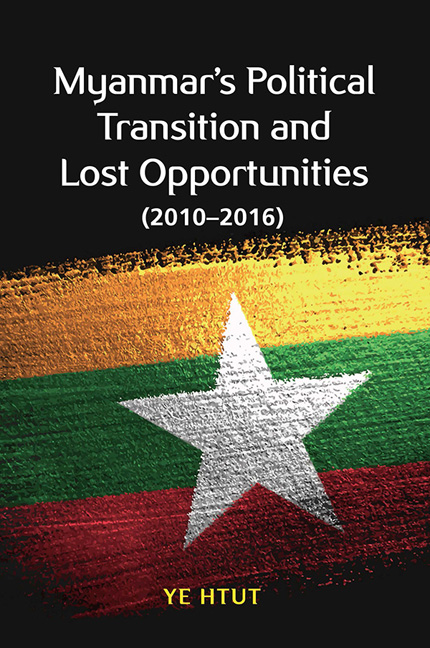Book contents
- Frontmatter
- Contents
- Foreword
- Acknowledgements
- Introduction: Myanmar's Political Reforms
- 1 The National Convention
- 2 The Constitution
- 3 The Union Solidarity and Development Party
- 4 Myanmar Spring and Aung San Suu Kyi
- 5 The Union Government
- 6 The Government and the Parliament
- 7 Shwe Mann's Checkmates
- 8 Turning Points
- 9 Media Reform
- Epilogue
- Appendix A President Thein Sein's Inaugural Address
- Appendix B President Thein Sein's First Address to the Cabinet
- List of Interviewees
- Index
- About the Author
- Plate section
Appendix B - President Thein Sein's First Address to the Cabinet
Published online by Cambridge University Press: 25 January 2020
- Frontmatter
- Contents
- Foreword
- Acknowledgements
- Introduction: Myanmar's Political Reforms
- 1 The National Convention
- 2 The Constitution
- 3 The Union Solidarity and Development Party
- 4 Myanmar Spring and Aung San Suu Kyi
- 5 The Union Government
- 6 The Government and the Parliament
- 7 Shwe Mann's Checkmates
- 8 Turning Points
- 9 Media Reform
- Epilogue
- Appendix A President Thein Sein's Inaugural Address
- Appendix B President Thein Sein's First Address to the Cabinet
- List of Interviewees
- Index
- About the Author
- Plate section
Summary
I extend my warmest greetings to members of the Union Government and heads of Union organizations present on this occasion and wish you good health and happiness, and that you will be unremitting in your efforts to serve the nation and the people.
The Pyidaungsu Hluttaw session, which commenced on 31 January 2011, concluded yesterday. The Pyidaungsu Hluttaw has chosen and appointed the organizations and persons who will take charge of the executive, judicial and legislative branches at the Union level and likewise, the respective State and Region Hluttaws have elected and assigned similar tasks to the persons to take charge of these branches in their own regions.
So, those of us who have been elected and vested with due authority as leaders of the State and members of the government by the Hluttaw must now embark on the final step on the Seven-phase Road Map towards the realization of a modern, developed and democratic nation.
In implementing the final step of the Road Map it is essential to comprehend clearly what our perspectives should be and the policies we must follow. We as members of the executive and judiciary are responsible to undertake our assigned tasks for the establishment of a modern, developed democratic nation and as such we must be committed without reservation to accomplishing the final step of the Road Map.
This is why I would like to say that the crux of the points I wish to make and the work programmes envisaged are of vital importance for the future of the nation.
Heads of Union Government, Union ministers and deputy ministers
The most important task of the new administration is to work together to create Good Governance and Clean Government. To achieve these aims, the work of the Union Government and the state and region governments as well must be transparent, accountable and consistent with the Constitution and existing laws. The people's wishes and desires must be respected and there must be assurance of all-inclusiveness. It is also imperative that actions taken by the government be expeditious and effective.
The second task of the government is to promote and propagate democratic practices. Today, our country has a Constitution as a foundation on which to build a modern, developed and democratic nation. The legislative, executive and judicial pillars that emerged from the Constitution have come to life.
- Type
- Chapter
- Information
- Publisher: ISEAS–Yusof Ishak InstitutePrint publication year: 2019

